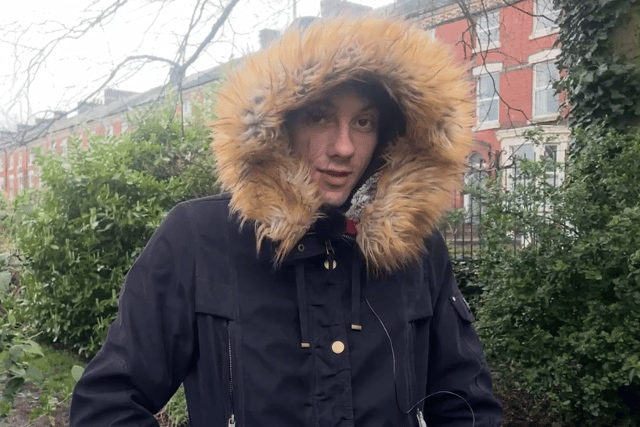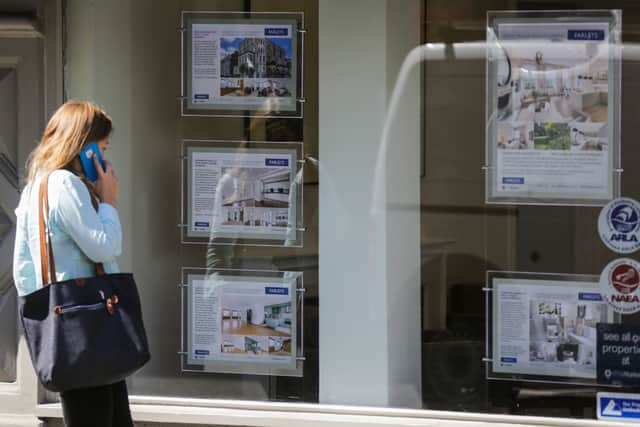I'm a sofa surfing chef in Liverpool and getting on property ladder is 'out of the question'
and live on Freeview channel 276
As Britain recovered from World War II, people from all social classes were able to start buying their own homes as the country was rebuilt. For many, getting on the property ladder wasn't a luxury, it was the norm. By 1971, on average people were paying £4,854 for a property. Compare that to December 2023, when HM Land Registry data placed the average house price in the UK at £284,691.
Wages have changed too, of course. Back in 1971, the average weekly pay was around £32, or £1728 per year. Today the average annual salary in the UK is £34,963 per year, according to the Office of National Statistics. At a basic level, the average home in 1971 cost 2.8 times the average yearly wage, while in 2023 it cost 8.14 times the annual salary.
Advertisement
Hide AdAdvertisement
Hide AdAdd in the spiralling cost of mortgage rates, property deposits and rent - all set against the background of a crippling cost of living crisis - and it's easy to see why a whole generation feel stuck in a rut, with little hope of owning a property.
In Liverpool, the average house price in December last year was £174,603, Land Registry figures show. It means young people need to save around £17,400 for a standard 10% deposit for a mortgage. To some, this might seem an achievable goal, but for many young people - who are working full time, paying rent, paying bills and living independently - it's an impossible task.
Not to mention, most high street mortgage lenders allowing a borrowing multiple of 4.5 times your salary - meaning young people earning £20,000 per year are looking at being approved for mortgages of less than £100,000. Swathes of 25 to 35 year olds who straddle the Millennials and Generation Z demographic have little hope of saving a deposit and are stuck at home, with student loans to pay, or in a rent cycle with young families in inadequate housing. They want, need and deserve help and change - but is it coming?
As we edge towards a general election, National World's 17 city world division news titles are collaborating to launch Project Peter Pan: championing the lost generation we reveal the realities of a generation who work hard and have aspirations that are now seemingly out of reach - through no fault of their own.
Advertisement
Hide AdAdvertisement
Hide AdWe spoke with three young people in Liverpool - Kathryn, Levi and Sam - who all face drastically different living situations, to find out how the current financial climate is affecting their dreams of ever owning property.
Levi, 25


For Levi, owning a property isn't something he has even considered, as he has found himself 'sofa surfing' after the breakdown of his relationship. The 25-year-old dad-of-two currently lives at multiple addresses around the city, while working as a trainee line chef and kitchen porter at a local cafe.
Though he doesn't have any debt, Levi does not have a permanent residence. He was previously paying around £800 for rent and bills at a two-bed property, which he said had left him with £200 to spend on himself and his children per month.
Now working three days per week, Levi earns around £600 a month and after paying for temporary accommodation, is left with just £20 a week to survive on. Only paying for 'essential wares', Levi said the only 'luxury' he ever sees is tips from customers.
Advertisement
Hide AdAdvertisement
Hide AdThough he currently works part-time, Levi wants full-time hours to provide more for his family. He told LiverpoolWorld: "I want to become a chef so I can work long hours, earn a good wage and provide for my family. I want to find somewhere to live so I can have my children with me."
Levi's current housing situation has affected his mental health. "You feel embarrassed. You feel low about it... You think about how other people perceive you," he explained.
Focusing on trying to find stable accommodation to rent, Levi doesn't think owning a home is on the cards any time soon. He said: "There's no chance of that with the way everything's going, prices are rising and rising and rising for houses... truth be told it's out of the question, or when I'm about 80."
Asked whether he thought owning a house would be easy when he was growing up, Levi said he did, adding that he had grown up with a hard-working dad. He said: "Now, I've realised it's not easy. It's one of the hardest things to do, to get your foot in the door."
Advertisement
Hide AdAdvertisement
Hide AdLevi said he 'stays indoors' most of the time, and occasionally goes for walk with friends. "I don't go out for food, or drinks like someone my age usually does. I need to save and it's too expensive," he said.
While many young people are struggling with the idea of never owning a home, Levi thinks there needs to be more of a focus on helping young rough sleepers find temporary or rentable property. He said if 'we don't help youth find temporary accommodation' they won't be able to work hard and save the money needed to own future property.
Sam, 28


Even those who have managed to save a deposit are not finding it easy, with 28-year-old Sam finding that the market in Liverpool is saturated with buy-to-let, investment-only properties, and unaffordable interest rates. Currently living with his parents in Liverpool, and working full-time in architecture, with a salary of £30,000, Sam has managed to save more than £20,000 for a deposit, after being extremely disciplined with his spending and putting away £1,000 a month.
Planning to live in the city centre, for an easier commute to work, Sam told LiverpoolWorld that the property market is not tailored towards first-time buyers. "I will find a two-bed, city centre property that's in my kind of budget of £110,000-£150,000, in a brilliant location, with little to no work needing to be done, but I can't buy it. Every time I find a well-priced property that fits my needs, I'll see 'INVESTMENT ONLY' on the advertisement and it feels like a kick in the teeth." He explained.
Advertisement
Hide AdAdvertisement
Hide AdSam continued: "I'll then find a similar property, available for residential buyers, and the price will be drastically more. It feels like we're constantly hearing about exciting new apartment complexes coming to Liverpool, but every one seems to be targeted towards investors who will then rent them out to students."
He also mentioned how high interest rates are 'ruining' his hopes of buying property by the summer, noting: "A few years back, you could buy a house for £100,000 and your mortgage could be around £350 a month. Now, you're easily looking at double that. I've got a deposit which should be enough for a higher priced property, but I wouldn't be able to pay the monthly mortgage."
With hefty student debts of more than £50,000 and seven years of higher education, Sam recognises how 'lucky' he is to have been supported by parents whilst saving, but believes companies should be offering better pay. He said: "The cost of buying property has gone up and so have the costs of trains to work, yet most of us have barely had a pay rise over the last few years. When we have been given an increase, it's been nowhere near the rate of inflation and honestly, it makes you wonder why you spent so long studying in a professional field."
Sam continued: "I am so lucky that my parents have been able to support me, but I have sacrificed my independence a lot, moving back home after my undergrad. Some of my friends and colleagues didn't have that option and are now in stuck in a renting cycle with no hopes of saving.
Advertisement
Hide AdAdvertisement
Hide Ad"We need to see more support and opportunities for first time buyers, more accessible options like better rent-to-buy schemes and honestly, most employers need to pay their employees better."
Kathryn, 32


Kathryn is a nurse, but is currently unemployed due to ill health. Living with her partner in Liverpool, Kathryn rents through a private landlord and said that even when she was working, she was living pay check to pay check. She told LiverpoolWorld: "The cost of transport to work, food, toiletries, union costs, pet insurance, meant it was hard to save. Trying to do activities on my days off were also expensive, especially as I have health conditions which means I often need to use taxis more than others."
Whilst working part-time, Kathryn earned around £18,000 per year and applied for Personal Independence Payment (PIP) - the replacement for Disability Living Allowance - which provides help with extra living costs for those who have 'a long-term physical or mental health condition or disability' and 'difficulty doing certain everyday tasks or getting around because of [their] condition'. While the government scheme is available for those who are working, Kathryn said her ability to work meant she did not qualify. Despite this, she did manage to save around £2,000, but said the 'meagre savings' are now being used for food and essentials.
The 32-year-old said she always expected to own her home by the time she was 30, based on the experiences of older generations. She said: "I expected to work and take some years to save for a deposit. I grew up in a home my parents owned and my friends' parents owned their homes too. My parents weren't university educated, but managed to buy a house - worth £13,000 at the time - with a £3,000 deposit, which it took them around two years to save. The same house is now worth more than £140,000.
Advertisement
Hide AdAdvertisement
Hide Ad"Everyone I know is struggling with the cost of living and wages have not increased at the same rate or percentage as house prices and it is extremely difficult for people my age to get on the property ladder."
Currently relying on her partner's income to pay the bills, Kathryn said she has woken up in panic attacks because of her financial situation. "I cannot see the light at the end of the tunnel. Even if I am able to work again, I will have to start from scratch with savings for a deposit," she said'
Kathryn said the Conservative government has 'ruined the country' and is 'keeping working class people stuck in a dead end'. She continued: "I would like to see house prices drop to more reasonable amounts and I think wages need to increase. It should be possible for a person on a wage of £25,000 to save for a deposit within five years at most."
She added that companies should be more willing to provide adjustments for those disabilities, stating: "Companies need to stop enforcing hybrid working. Covid proved many roles can be done from home and, for people like myself who are not physically fit to attend offices everyday, we may still be able to do the role from home, with training done online."